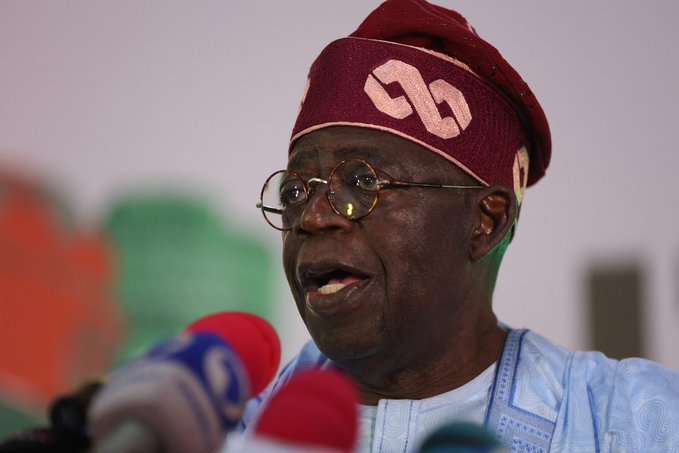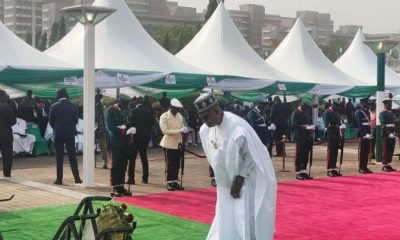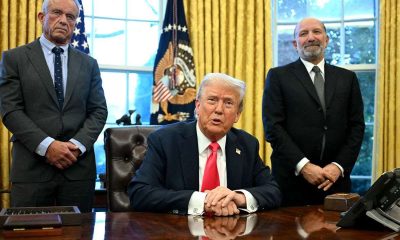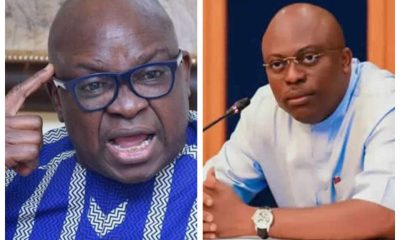Politics
Tax Bills: President Tinubu’s key reform policy in trouble

…as North raises opposition against it
When on Thursday, October 31, the Senate and the House of Representatives unexpectedly went on a long recess, it was to, sources said, avoid what was shaping up to be days of chaotic sessions on the floor of the National Assembly over President Bola Tinubu’s tax bills.
In line with the parliamentary calendar, lawmakers usually do not go on recess at this time of the year when the president is expected to submit the budget and other related documents. But the impending confrontations over the bills, it was gathered, forced the unusual recess.
The four tax bills, which stemmed from the recommendations of the Presidential Committee on Fiscal and Tax Reforms headed by Taiwo Oyedele, for the review of existing tax laws, is said to be at the heart of Tinubu’s fiscal reforms, but had as soon as they came to light late last month, received spirited opposition from key northern stakeholders, including governors, senators, members of the House of Representatives and leaders of sociopolitical groups from the region, who saw it as anti-North.
The bills are the Nigeria Tax Bill 2024, which is expected to provide the fiscal framework for taxation in the country; the Tax Administration Bill, which will provide a concise legal framework for all taxes in the country and reduce disputes; the Nigeria Revenue Service Establishment Bill, which will repeal the Federal Inland Revenue Service Act and establish the Nigeria Revenue Service, and the Joint Revenue Board Establishment Bill, which will create a tax tribunal and a tax ombudsman.
But at the heart of the northern rage is the proposed shift to a derivation-based model for Value Added Tax distribution, which would allocate tax revenue to the states, where goods and services are produced, rather than equally.
“For the avoidance of doubt, the Northern Governors’ Forum is not averse to any policies or programmes that will ensure the growth and development of the country. However, the forum calls for equity and farness in the implementation of all national policies and programmes so as to ensure that no geopolitical zone is short-changed or marginalized”, a communique at the end a meeting of northern governors and other key stakeholders in Kaduna days ago, read.
The meeting, which held at the Kashim Ibrahim House on Monday, October 28, had who was who from the region in attendance, governors Uba Sani of Kaduna State, Inuwa Yahaya (Gombe), Dauda Lawal Dare (Zamfara), Abdullahi A. Sule (Nasarawa), Babagana Zulum (Borno), Bala Mohammed (Bauchi), AbdulRahman AbdulRazaq (Kwara), and Ahmadu Umaru Fintiri (Adamawa). Deputy governors from other Northern states were also in attendance.
It also had in attendance notable traditional rulers, including the Sultan of Sokoto, Alhaji Muhammad Sa’ad Abubakar III; Shehu of Borno, Alhaji Abubakar Ibn Umar Garba Al- Amin El-Kanemi; Emir of Zazzau, Ambassador Ahmad Nuhu Bamalli; Ohinoyi of Ebira land, Alhaji Ahmed Tijani Anaje; Etsu Nupe, Alhaji Yahaya Abubakar; Emir of Kazaure, Alhaji Najib Hussaini Adamu; Emir of Bauchi, Alhaji Rilwanu Sulaiman Adamu, among others, including the Chief of Defence Staff, General Christopher Musa.
The meeting, according to sources, was meant to send a strong message to the president who had relied on northern votes to be declared winner of the 2023 presidential election.
“A fight is coming,” said an analyst with knowledge of events in the region, on the condition of anonymity. “The perception is that Tinubu has challenged the North. He has taken a confrontational attitude towards the North, but the North has now made it clear that the bill is not wanted. So, there’s a fight coming.”
The argument of the North is that the bill will benefit, particularly Lagos to the detriment of mostly Northern states. Lagos, which generates the bulk of Nigeria’s VAT revenue – about 55 percent – gets the short end of the sharing stick because 30 percent of VAT is distributed based on the population of the states, while the remaining 50 percent is shared equally among all states. This means that while it generates more than half of the total, Lagos gets almost same share as Kano, which on paper has more population, but generates only 1.4 percent of the VAT.
“If the bill passes, Lagos would become very rich, in fact richer than the oil producing states. Lagos, Ogun and Rivers will be the biggest beneficiaries should the bill pass,” said the analyst. “But it’s going to be very difficult.”
The new VAT hopes to correct this anomaly by disturbing VAT according to derivation, but as with the case of oil revenue, the North has stood its ground, insisting on the status quo.
Governor Inuwa Yahaya of Gombe, who doubles as the chairman of the Northern Governors Forum had while reading the communique, said the region was worried, noting that the economic hardship currently faced by Nigerians is more pronounced in the Northern region than the Southern region due to what he called “disparities in economic inequality.”
Imminent Confrontation
The National Economic Council (NEC) headed by Vice President Kashim Shettima with the 36 state governors as members, had a fortnight ago in a communique read by Governor Seyi Makinde of Oyo State, advised the executive to withdraw the bill from the National Assembly pending further deliberations.
However, Tinubu rejected the advice, insisting in a statement by his special adviser on media and strategy, Bayo Onanuga, that the bills will go through legislative processes.
“President Tinubu commends the National Economic Council members, especially Vice President Kashim Shettima and the 36 State Governors, for their advice,” the statement had said.
“He believes that the legislative process, which has already begun, provides an opportunity for inputs and necessary changes without withdrawing the bills from the National Assembly.
“While urging the NEC to allow the process to take its full course, President Tinubu welcomes further consultations and engagement with key stakeholders to address any reservations about the bills while the National Assembly considers them for passage”, the statement added.
But the bills need two-third majority to pass at the National Assembly that has Northern majority, most of whom have expressed opposition to the bills. Indeed, speaking on Tuesday on Channels TV Politics Today, Ali Ndume, the senator representing Borno South, had declared that the bill was dead on arrival without necessary consultations.
“My advice is that as the northern governors and the NEC has said that the president should withdraw the bills and should do more consultation and he should carry Nigerians and the public along,” he had said.
“But if it goes on like that, I can tell you that it will be dead on arrival. We don’t need to study the bill. The general thing is that Nigerians are not willing to pay any tax now considering the situation we have faced because this is government of the people.
“A country is working on tax reforms that will reduce the burden on the citizens. In fact, they have abolished most of the taxes from 17 to three percent.”
Ndume is not alone. Dandutse Muntari, senator representing Katsina South had also staunchly opposed the bill on the floor of the senate. Yet, the duo are only part of a group of Northern political office holders, including governors and senators, who Business Hallmark gathered, are now actively mobilizing against the bill ahead of November 19 when the senate will resume sitting.
Senator Muntari had earlier when the Chairman of Federal Inland Revenue Service, Zacch Adedeji appeared before the senate for an interactive session on objectives of the tax reforms bills , vowed that the proposed legislation would not see the light of the day .
It was gathered that the rallying of the Northern political bloc against the bill is being championed by all 13 governors of the North West and North East and two from the North Central. While two of the four presiding officers of the National Assembly, who are from the North West are being pressured to align with position of the governors.
“The North certainly won’t accept that bill,” Hussaini Mohammed, a Borno based analyst, told Business Hallmark. “Tinubu should know that there are certain limits he can’t go beyond.”
Presidency Not Backing Down
Meanwhile, despite the spirited opposition from the North, Mr. Taiwo Oyedele, Chairman of the Presidential Committee on Fiscal Policy and Tax Reforms, said on Friday that the federal government will not back down from its proposed changes in Nigeria’s tax laws.
Oyedele who spoke during an interview with Bloomberg, maintained that the tax reforms would ensure revenue “doubles within the next two to three years as a share of gross domestic product (GDP)”.
According to him, “If we are moving from nine percent to 18 percent, that means we are doubling it.”
Oyedele said the government would not back down, though elements of the plan could be tweaked.
“The worst case scenario is to drop the controversial issues,” he said. “There’s an outcome of it going ahead as proposed, or the one that goes ahead with modification, which is okay.”
Fresh Debate on Derivation
The VAT controversy, has meanwhile, opened a fresh debate about Nigeria’s perennial disagreements about revenue generation and sharing formula. The formula allocates 52.68%, 26.72%, and 20.60% to the Federal, State, and Local Governments, respectively. The 26.72% and 20.60% accruing to the States and Local Governments is further shared by applying factors, such as equality, population, land mass, IGR, and social development, while 13 percent derivation goes to the oil-producing states.
From colonial times, the British colonial government had pushed a policy of putting revenue in a common purse for the benefit of parts of the country. Indeed, when the North attempted to secede during the counter-coup of July 1966, the British advised them against the move because they were going to lose that revenue balance. This was why General Yakubu Gowon moderated his earlier speech and insisted on a united Nigeria.
Then, a few months down the line during the civil war in 1967, Gowon, then head of state, did the Petroleum Control Decree, which nationalized petroleum resources until agitation by the oil-producing areas forced the federal government to concede tokenist measures, such as the Oil Mineral Producing Areas Development Commission (OMPADEC), Niger Delta Development Commission (NDDC) and subsequently the Ministry of Niger Delta, which has been scrapped.
However, the oil-producing states have continued to argue that the existing sharing formula – which has tended to favour the argument of the North with its landmass and population – is flawed, hence the whole debate about resource control. The VAT derivation push is seen to be led by the South West geopolitical zone, which stands to benefit more from it, but for some, the argument is whether the debate should be limited to VAT.
“It is quite an Ojota situation,” said Mr. Richard Mammah, a journalist and author. “Nigeria has to address wholesale its issues of governance and its issues of structure. All these little tinkering will not help. We have to deal with the problems wholly.
“The benefit that Lagos would get from the VAT reform is obvious, but the question is, are you going to use the same hand that you would justifiably enhance Lagos revenue from the point of consumption, to deal with the issue of oil production? Is it going to be derivation only for VAT or derivation for every resource? That way you can be talking about solving the problems together, and not trying to solve a bit of it, which would lead to other levels of grumbling.”
He insisted, however, that the fiscal reforms do not go far enough, as according to him, production should get more attention.
“But the fiscal reforms that are being pushed now still do not go far enough. There are two dimensions. The first has to do with tax and revenue, and that’s what the presidency is pushing. But it’s a subset of the bigger picture because you cannot get to tax and you cannot get to revenue without production. If you have not done the more substantial reforms of productivity by encouraging in-country production, you cannot go far,” he noted.











